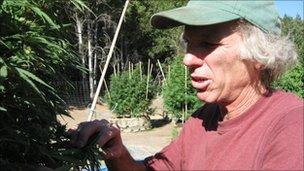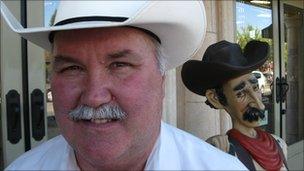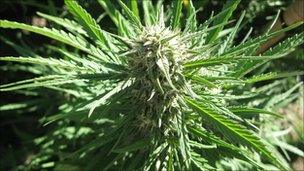Will legalising marijuana fix California's problems?
- Published
On a raid for illegal marijuana crops
California spends a countless amount of money each year fighting its illegal marijuana trade. But can legalising the drug in the state be the answer to its woes?
The helicopter hovers above steep brush-covered slopes of a remote canyon in southern California.
We are on a raid, tracking America's biggest cash crop - marijuana.
The pilot, an LA County Sheriff's deputy, points out agents below searching through dry undergrowth.
The terrain, the Angeles National Forest, is so difficult that they had to be lowered in from the air.
The forest is a protected wilderness area, less than two hours from Los Angeles. But it is also remote enough to offer a good hiding place.
Authorities say organised crime gangs, including Mexican drug cartels, are increasingly using inaccessible, often publicly owned land like this to grow huge amounts of marijuana.
It's an industry estimated to be worth around $35bn (£22bn) a year in the US, and no other crop comes close.
Illegal growers profit, while taxpayers fund eradication exercises like this.
Ground teams pull up plants they find for later destruction.
But Captain Ralph Ornelas, from the Bureau of Narcotics at LA County Sheriff's Department, admits they recover "maybe 1-5%" of illicit plants.
A 'hippy haven'
Now many argue legalising marijuana might be a more effective weapon in taking control of this lucrative trade out of the hands of criminals.
Inside the gates of Area 101 marijuana plantation
In northern California, the majestic redwood forests of Mendocino County are part of an area known as the Emerald Triangle, a long-time hippie haven and centre of cannabis cultivation.
The distinct sweet smell wafts into the car as we pull off Highway 101 by a hand-made sign depicting a UFO.
We are in Area 101, a spiritual retreat and focal point for local marijuana growers.
In a peaceful glade there are a few wooden buildings and a statue of the Hindu elephant god Ganesh adorned with garlands. A peace sign made of fairy lights also hangs between two trees.
Children play, adults rake leaves.
Tim Blake runs Area 101 and a collective of growers lobbying for legitimacy.
He leads us deeper into the forest, through two heavy steel gates, to a clearing where, behind wire mesh, a neat plantation of marijuana plants is being watered, tended and pruned.
They are broad and up to 10ft (3m) high. The distinctive four-pronged leaves are a healthy green, while the buds are spongy and thistle-like.
In a few weeks, it will be harvest time, Mr Blake says.
As we walk through the field, Mr Blake points out the indica and sattiva varieties, which produce different effects.
He talks of his crop as a farmer might discuss apples or grapes. Except a pound of cannabis would cost you upwards of $1,500 (£947).
Wine industry rival
To the south of us lie the Napa Valley vineyards, which produce a great deal of wealth for California.
Mr Blake dreams of a legitimate marijuana industry that could one day rival wine.
"Basically, this is the most expensive boutique crop in the world, and up until now it's gotten very little of the acclaim or acknowledgement for it," he says.
"[Growers are] tired of being in the shadows, they want to be able to voice their opinions, they want to come out and be good Americans," he adds.
In a few weeks California's voters will be asked to decide if it should be legal to grow small amounts of marijuana for personal use.

Mr Blake says the marijuana industry could one day rival the state's wine industry
Latest opinion polls suggest a close race.
Governor Arnold Schwarzenegger does not support the measure, but he recently downgraded possession from a misdemeanour to an infraction, the lowest level of offence under state law.
Adults caught with an ounce of marijuana will get a $100 (£63) ticket but no criminal record.
It's a money-saving measure in a state reeling from the recession and slashing services to make ends meet.
"In this time of drastic budget cuts, prosecutors, defence attorneys, law enforcement and the courts cannot afford to expend limited resources prosecuting a crime that carries the same punishment as a traffic ticket," Mr Schwarzenegger said.
The proposition to legalise marijuana is also driven by money.
The bill would allow local authorities to licence growth and tax sales.
Boosting the economy
There could be big profits in legal highs - as much as $1.4bn (£890m) a year for the cash-strapped state.
Marijuana for medicinal use is legal in California as long as you have a doctor's note to buy it and a permit, like Tim Blake, to grow it.
Thousands of so-called pot dispensaries have sprung up, and California has earned millions by taxing this brisk trade.
Many predict growth in medical marijuana if voters approve legalisation.

Mr Pinches hopes marijuana will soon be used as a source of tax revenue in California
Some even imagine a future in commercial recreational sales, along the lines of cigarettes and alcohol, and the commerce that might bring.
Near Area 101, in the small California town of Willits, a sign across the highway welcomes tourists, "Gateway to the Redwoods".
It is also a reminder that the logging industry once underpinned the local economy. Now it's marijuana money.
John Pinches wears a cowboy hat as we walk down the main street.
This sixth generation rancher is an elected county official.
"If you walk into a store and buy a pair of pants nobody's going to ask you where the money came from," he says.
"But in this town it comes from [marijuana]?" I ask.
"I would say probably at least 75%," Mr Pinches says.
In a few weeks, Mr Pinches hopes voters will re-elect him and also vote yes to making marijuana a source of tax revenue.
"If we can get 7% or 8%, an 8.5% rate, same as our sales tax rate, it would certainly solve budget problems, not only government but our school systems too."
A 'troublesome' drug
But the medical marijuana example is controversial to say the least.
Opponents complain dispensaries bring trouble to residential neighbourhoods and that some healthy California residents claim to be sick to get marijuana.
There are also concerns about wider availability.
"People are going to be overdoing it," one man says, outside a highly visible marijuana dispensary on Venice Beach's boardwalk.
"Pretty soon you're going to have kids doing it," he says.
"There's a line that needs to be drawn. If you actually need it for a specific disease then you obviously need it if it helps," a young woman says.
"But if you're just doing it to get high, then that's just stupid."
And some question how much money legal marijuana would actually yield.

Experts say legalising marijuana could bring as much as $1.4bn a year to California
Tax revenues might be offset by the costs of administering the new industry.
Back in the canyons of southern California, a helicopter drops bundles of seized cannabis plants at the staging area where Sheriff's deputies and FBI agents load them onto trucks.
It's a small victory against drug gangs.
But the presence of the FBI is a reminder that, regardless of how Californians vote, marijuana will remain illegal under federal law and in other states - and that means there will still be a huge underground market.
"This won't change," Capt Ornelas says.
He says if voters approve legalisation "drug cartels will still seek to augment and add to the marijuana that's grown".
He adds: "This marijuana isn't just for California. This marijuana will be shipped out to other states in the United States. There still will be, I believe, young peoples' lives jeopardised."
- Published30 July 2010